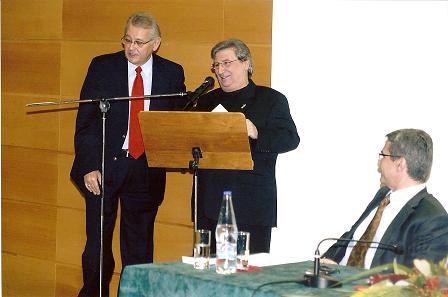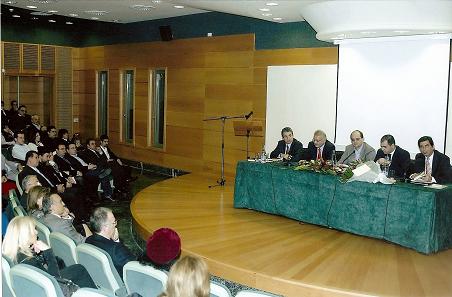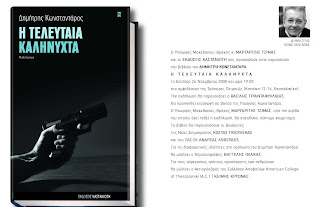Ποδηλατόδρομοι στη Θεσσαλονίκη
Τετάρτη 7 Οκτωβρίου 2009
Σε 10 μέρες αρχίζει η κατασκευή ποδηλατοδρόμων στη Θεσσαλονίκη
Αλλάζει εικόνα η Θεσσαλονίκη κι έρχεται πιο κοντά στα Ευρωπαϊκά πρότυπα. Αρχίζει να μοιάζει ακόμη περισσότερο με τις ανεπτυγμένες μεγαλουπόλεις του εξωτερικού. Αφορμή, η κατασκευή του νέου ποδηλατοδρόμου που θα ξεκινάει –μετά την ολοκλήρωση της πρώτης φάσης- από το Μέγαρο Μουσικής και θα καταλήγει στο σιδηροδρομικό σταθμό.
Με τον τρόπο αυτό, οι ποδηλάτες κι όσοι θέλουν να βάλουν αυτό το εναλλακτικό μέσο μετακίνησης στη ζωή τους, θα έχουν εύκολη και ασφαλή πρόσβαση σε κεντρικά σημεία της πόλης.
Σημαντική μέρα για το συγκεκριμένο ζήτημα ήταν η χθεσινή, καθώς, το πρωί, ο Δήμαρχος Θεσσαλονίκης Βασίλης Παπαγεωργόπουλος, υπέγραψε τη σχετική σύμβαση, ώστε να αρχίσουν οι εργασίες για την κατασκευή του έργου. Σύμφωνα με το πλάνο η έναρξη των εργασιών θα είναι άμεση(περίπου σε 10 μέρες), ενώ όπως τόνισε ο Αντιδήμαρχος Βαγγέλης Δημητρίου το έργο αναμένεται να ολοκληρωθεί μέχρι της 15 Οκτωβρίου.
Το κόστος κατασκευής του ποδηλατοδρόμου ανέρχεται στο 1.500.000 ευρώ, χρήματα τα οποία δίνονται από το 3ο Κοινοτικό Πλαίσιο Στήριξης, με κωδικό «Αεροδρόμια και Λιμάνια».
Να σημειώσουμε πως η εκταμίευση των συγκεκριμένων χρημάτων πρέπει να έχει γίνει μέχρι της 31 Δεκεμβρίου. «Για το λόγο αυτό επειγόμαστε, για να μη χαθεί ούτε ευρώ», μας λέει ο αντιδήμαρχος Έργων, Βαγγέλης Δημητρίου.
Ποδηλατόδρομος ευρωπαϊκών προδιαγραφών
Ο ποδηλατόδρομος θα κατασκευαστεί με Ευρωπαϊκές προδιαγραφές. Τα υλικά που θα χρησιμοποιηθούν δεν υπάρχουν στην Ελλάδα και ο ανάδοχος θα πρέπει να τα φέρει από το εξωτερικό. Θα διαθέτει τάπητες, οι οποίοι δεν θα είναι απλός βαμμένοι, αλλά θα είναι από έγχρωμη άσφαλτο (κόκκινη), ώστε να ξεχωρίζει από τον υπόλοιπο δρόμο, ενώ δεξιά και αριστερά θα υπάρχουν πλαστικά προστατευτικά που θα ξεχωρίζουν, κάτι που «θα τον κάνει επιβλητικό, και θα εμπνέει σεβασμό», σύμφωνα με τον κ. Δημητρίου.
Το σχέδιο για την κατασκευή ενός δικτύου ποδηλατοδρόμων που θα καλύπτουν όλο το πολεοδομικό συγκρότημα της Θεσσαλονίκης και τους γειτονικούς δήμους περιλαμβάνει δύο φάσεις. Η πρώτη που υπογράφηκε χθες θα καλύπτει μία απόσταση 12 χιλιομέτρων, που θα ξεκινάει από το Μέγαρο Μουσικής, θα πηγαίνει στην νέα παραλία και θα συνεχίζει στην παλιά, θα ανεβαίνει από την Δωδεκανήσου, Κουντουριώτη , Αναγεννήσεως και θα καταλήγει στον σταθμό των τρένων.
Επίσης θα υπάρχουν κάθετοι άξονες από διάφορες περιοχές, οι οποίοι θα συναντούν και θα συνδέονται με την παραλιακή. Η δεύτερη φάση η οποία αναμένεται να συζητηθεί του χρόνου περιλαμβάνει τα πανεπιστήμια, κάτι που θα βοηθάει και θα εξυπηρετεί πολλούς φοιτητές, ενώ θα ενωθεί με αυτόν τον τρόπο η ανατολική και η δυτική πλευρά της πόλης.
Στη δεύτερη φάση περιλαμβάνεται και η κατασκευή ποδηλατοδρόμου στις περιοχές Τούμπας και Χαριλάου.
Στην καθιερωμένη συνέντευξη τύπου ο Δήμαρχος Θεσσαλονίκης Βασίλης Παπαγεωργόπουλος αναφέρθηκε στο έργο της κατασκευής ποδηλατοδρόμου σημειώνοντας τις προσπάθειες που έχει κάνει ο δήμος τόσο καιρό προς αυτή την κατεύθυνση. “Ο Δήμος κάνει μεγάλη προσπάθεια ώστε να προωθήσει έναν εναλλακτικό τρόπο μετακίνησης των πολιτών, ακόμη και των επισκεπτών της πόλης. Έτσι καθιερώσαμε τα τελευταία χρόνια να προσφέρουμε 500 ποδήλατα το χρόνο. Μέχρι στιγμής έχουμε μοιράσει συνολικά πάνω από 2.000 ποδήλατα. Φέτος το Σεπτέμβριο, Οκτώβριο, Νοέμβριο και Δεκέμβριο θα μοιραστούν ακόμα 500. Έχουμε βάλει ήδη στον προϋπολογισμό του 2010 ένα ικανοποιητικό κονδύλιο, ώστε να αγοράσουμε και να μοιράσουμε 1000 ποδήλατα την επόμενη χρονιά. Θέλω να σημειώσω επίσης πως αγοράσαμε ειδικά ποδήλατα για τις μετακινήσεις της δημοτικής αστυνομίας για την καλύτερη αστυνόμευση του ποδηλατοδρόμου”.
Ο λόγος στους ποδηλάτες
Τι λένε όμως και οι πολίτες οι οποίοι χρησιμοποιούν το ποδήλατο ως κύριο μέσο μεταφοράς εδώ και αρκετά χρόνια; Ο Κείμης Κρυωνάς είναι εδώ και πολλά χρόνια “εραστής” του ποδηλάτου μιας και όπως λέει και ο ίδιος είναι το πιο αβλαβές μέσο μεταφοράς για το περιβάλλον. “Η δημιουργία ποδηλατοδρόμου είναι μία πάρα πολύ καλή κίνηση. Με την κατασκευή του σίγουρα θα αυξηθούν ακόμη περισσότερο οι χρήστες ποδηλάτου, κάτι που θα βοηθήσει ώστε όλοι οι πολίτες σιγά σιγά με την καθημερινή οπτική επαφή με ποδηλάτες να αποκτούν διαφορετική συνείδηση και άποψη για το συγκεκριμένο θέμα”, υποστηρίζει.
Ένας άλλος πολίτης που έχει σαν βασικό του όχημα μεταφοράς το ποδήλατο ο Κώστας Συμελίδης, βαλκανιονίκης στην ποδηλασία –και πρόσφατο θύμα τροχαίου, ενώ οδηγούσε το ποδήλατό του στον… ποδηλατόδρομο της παραλίας, μας είπε: “Είναι μία πολύ θετική κίνηση , θα βοηθήσει πολύ ώστε οι οδηγοί Ι.Χ να εξοικειωθούν με την ύπαρξη ποδηλατών, και να τους αντιμετωπίζουν με περισσότερη προσοχή. Είναι το πρώτο βήμα, για να μπει στην ζωή μας το ποδήλατο. Ευελπιστώ στο μέλλον οι ποδηλατοδρόμοι να έχουν δικές τους λωρίδες στο δρόμο”.
Θετικοί, με την προσπάθεια του δήμου και οι πολιτικοί μηχανικοί. Ο πρόεδρος του Τεχνικού Επιμελητηρίου Ελλάδος – Τμήμα Κεντρικής Μακεδονίας(ΤΕΕ/ΤΚΜ), Τάσος Κονακλίδης, υποστηρίζει ότι «πρέπει να δημιουργηθούν ποδηλατόδρομοι και σε άλλες περιοχές. Να φθάνουν ως την Πυλαία, αν είναι δυνατόν. Να εκμεταλλευτούμε τα ρέματα της περιοχής. Υπάρχουν κι εκεί επίπεδες εκτάσεις, για να χρησιμοποιούν οι ποδηλάτες».
Όσο για τον αν θα δοκίμαζε ο ίδιος να ποδηλατήσει από το Σιδηροδρομικό Σταθμό ως την Πυλαία, απαντά, χαμογελώντας: «Τουλάχιστον θα… προσπαθούσα…»
Πηγή Περιβάλλον-(ΘΕΣ)σαλονικιώτικοι ρυθμοί


 Με πολύ κόσμο στο Πολιτιστικό Κέντρο της Τράπεζας Πειραιώς, με χιούμορ από τον Χάρρυ Κλυν, εύστοχες παρατηρήσεις από τους βουλευτές Κώστα Γκιουλέκα και Ανδρέα Λοβέρδο, ενδιαφέρουσες επισημάνσεις από τους Βαγγάλη Π
Με πολύ κόσμο στο Πολιτιστικό Κέντρο της Τράπεζας Πειραιώς, με χιούμορ από τον Χάρρυ Κλυν, εύστοχες παρατηρήσεις από τους βουλευτές Κώστα Γκιουλέκα και Ανδρέα Λοβέρδο, ενδιαφέρουσες επισημάνσεις από τους Βαγγάλη Π


